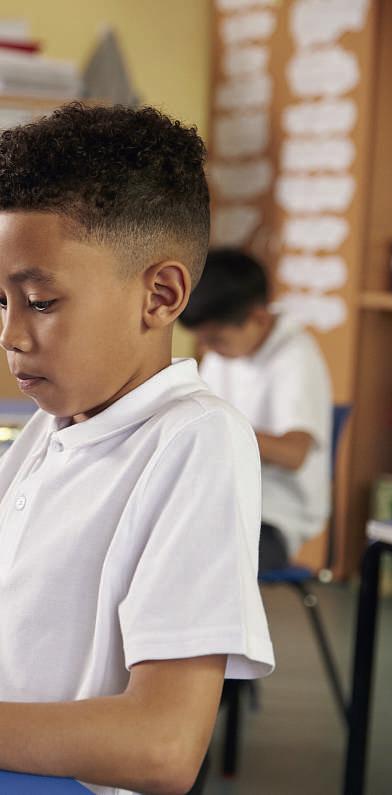
6 minute read
Traumatic Brain Injury–ahidden disability in our classrooms

Jo Mitchinson takesa closer look at the effects head injuries can haveonchildren at school.
ach year approximately 1million people in theUKattendaccident and emergencyfollowing aheadinjury.
Thevast majorityofthese are minor, with concussivesymptomspassing relativelyquickly (datafrom Headway). But what aboutthose who sustain amore significant injury, whichleavesthem with longlasting or permanent changestotheir brain?
Resilience Programme, whereItrainedtobea course facilitator,and lateralongside Bounce Forward to developtheir highly successful resilience lessons.
JO MITCHINSON
Jo qualified as a PE teacher from Loughborough University in 2001 and has been teaching for 21 years. She is currently the head of PSHCE at asecondaryschool in Hertfordshire and has aparticular interest in thepsychology of education.
Inevitably,manyofthe young people who suffer withanAcquiredBrain Injury (Traumatic Brain Injuryor Non-TraumaticBrain Injury) will, in time, be satonce again in ourclassrooms. Their learningstyle,the speed of processing, their behaviour,concentration, or speech mayhave been alteredinaninstant.
So, what specific difficulties might these young people face and how canwesupport them in aschoolenvironment?
My interest in thebrain datesback to my degree Ifound myselfdrawntowards choosingmodules that focused onpsychology,bothinsportand in education. The psychology of learningwas oneofthe most powerful and insightfulmodulesI completed. Little didI knowthat my future career would see me usethese skills, initiallywith the Penn
In June 2021, my daughter was involvedina cycling accident whilstracing aclosedloopcircuit. Her Garmin (speed sensor) shows thatshe was travellingat30mph immediatelyprior to the point of impactwith theground. Although there were no eyewitnesses, she remembers racing and having no time to react to arider fallinginfront of her. She then remembers spinningonher back Thefall, flight and landing areall missing. However,withthe help of thedamaged helmet and the expertiseof the neurosurgeons she’s managed toidentifythe key areaofthe brain which was damagedand they are confident in their assessment. My daughter landed on the back of her head; thedamage to her helmetisall there. Allher lastingdifficultiesthough aretothe frontal lobe; the areaofher brain at thefront. They therefore believe that her brain hitthe back of herskull onimpact before bouncing offittohit the frontofher skull. Thissecondarycontact has caused the damage
The Immediate Aftermath
Immediately after the accident shewas taken to hospital witha fractured collarbone and suspected fractured elbow. Therubbishshe wastalkingwas attributed to the morphine anditwasn’t until she moved that shebecameviolently sickand dizzy; this waswhenshe wasadmitted The following dayshe had seizureswhere her hands clawed and wouldn’t release,she was aggressive, terrifiedand confused.My mild daughter wasusing wordsI didn’tknow even knew and was screaming at doctors and fthat shewas dying;begging us to helpher when theconvulsions eased, shewas unable andsaying verystrange things. Thiswas the of aModerate Brain Injury(generally a sness between15mins and sixhoursor esia of up to 24 hours). Post-traumati amnesia epatient is conscious,but unable to follow or partakeinconversations. They may not be fully aware of their surroundingsand mightdoorsay bizarre things. Patientswith a moderatebrain injury arelikely to experience longlasting symptoms.
THESE SYMPTOMS FALL BROADLY INTO THREE SEPARATE CATEGORIES:

Physicaleffects, such as tiredness, headachesand dizziness Cognitive difficulties whichmight affecttheir thinking,attention andconcentration, memory planningand word finding Behaviouralproblems, such as irritabilityoranger
The Extent Of The Damage
On her returntoschool in September,12weeksafter the accident,itbecame apparent that thingsstill weren’tright and we sought additionalsupport. She wasmentallyexhausted and would lose the abilitytospeak, form sentencesorwould constantly repeat wordswhen tired. Shewas unable to make basic decisions (food, what to wear etc) andwas infuriated by veryinsignificant background noise. Pen tapping, page turning, heaters in classrooms etcwouldleave herangry and tearful.All of these areindicativeofcognitivedifficulties. Ourlocal hospitalreferred her to the neurosurgeryteam atGreat OrmondStreet Hospital (GOSH) anda full neuropsychology assessment followed.This showed that in unaffected areas such as motorcoordinationand visual perception shewas in the90thpercentile of age-relatednorm; this dropped to 20th and30thpercentile forcore language and readingcomprehension and 50thpercentile forall her verbal assessments.Inessence, she has losta decent chunkof herfunctioning– certainly enough forher and us to notice.
Speechfrustrations
It was the speech difficultiesthat had the biggest impact. In theearly days and months,itwas so affectedthat she taught herself BSL (British Sign Language)inorder to be able to ‘sing’ alongtosongs.
Her brain couldn’tformthe words fast enough to sing them. The speedatwhich she learnt this though remindedusthat her capacity to learn wasunimpaired– shejust needed to find newways to compensate for herdifficulties. HavingchosenGCSE Spanish, therequirement to converseina different languagewhensometimesyour own now eludesyou was daunting for her. Answeringquestions in classrequiredmore braverythanpreviously, as occasionally the words would “getstuck”and sherisked the perceivedjudgement of her peers.
Other academicchallenges were tasks suchaswatching avideoorlisteningtoa passageand takingnotes (twothingsat once),background noise(shestruggled in mock exams dueto thefields being mowed during an exam andotherstudents turningtheir pages) andprep/homework.
Motorwaysvs Countrylanes
We were putintouchwithThe ChildBrain InjuryTrust (CBIT),anincredible charity that Iwould highly recommendtoparents andstudents in thesamesituation,or teacherslooking forgreater understanding Iwatched alot of their videos and sent links to family memberstogivethem a better understandingofhow herbrainwas affected.Wewereassigned asupport worker,who explainedtoour daughter that our brainsare like roadnetworks– the motorways arefastest andthe country lanes the slowest way to arrive at adestination.
Some of her motorways areblocked and so she’shaving to rely on slowcountry lanes for thingsthatused tobequicktrips. Thistakes moretime and more effortthan previously andiswhy shefindsthings so mentally draining.She now has to concentrate much harder to do things that would havehappened subconsciously She reaches saturation point andneeds to resther braininthe same waythat someone witha physicalinjuryneedstorest thatlimb after they’veusedittoallow it to recover
Teaching
Strategies Of Support
Elps
Howdoes thissupportbecomeintegratedinto a busy, noisy classroom andschool environment?I think the most important factor is to ensure that information is disseminated to staff, whether that whole staff CPD,or part of newstaff induction,even a detailed email with an optional drop-in follow-up session. My daughter’sschoolhas an incredible SEN department who, on receipt of the full neuropsychologyassessment, used the GOSH recommendations her student profile (keyinformation on strategies to support all those on theSEND register).Alongside discussions with my daughter to establishher learning strengths and struggles as well as teacher inputthere is now anever evolving,but gold dust list of strategies that help her.
THESE INCLUDE GEMS SUCHAS:
ppor ab onm nt se is in .M inc essme on ma nt ed sh stru wa tl HA om eg ati th it daughter needs stafftob proactiveonthi realise that she’ it untilshe’s ove Giveher extrat verbal answers downifthe teach check her under Hands up que putting her on Workingwitha that her views but viaher part Acknowledge theoutcome. especially on bad previouslyproud thatbears no resemblance to the .S at in ge Completing hom ork afte tia d, or ry to it mo approach –regular short breaks can reduce fatigue and it’s easier to do this than to manage fatigueonce it’s occurred. My stafftobe proactiveonthis; shedoesn’t she’soverdoing overdone it! extratime toproduce ver wants to –avoid thes so thather can still be shared vi er eeded thatcan accessed if she needs abreak is overwhelmed. This isthe school’sstudent support centre, whichisalways staffed and whereshe lesson work in aquieter space, read, listen to music (which has helped from day one) or offload to amemberofstaffifshe needs It is effectively a‘factory reset’ forher andenables her to resumelessons with minimal disruptiontoher studies. learning.Mydaughter hates forgettingthings;she fi embarrassing and stressful. chunking information, bullet pointlis task handouts so that if shezones can still follow thelesson, school system or emailing them to herhelp hugely It’s her reality all learnbest by spe our students. Sheonce desc being akin toeverymobile phone,radio and TV we own playing differentmusiconfull volume in the sameroom, whilst everyhouseholdapplianceisalso on. Youdon’t understandwhy one elseisevenremotely bothered it because it hurts yourhead and makesyou feel sick.
This is essential–days.She has previouslyproudly handedinwork settaskatall.She hascompletely forgotten what shewas doing or zoned out duringa lesson and misseda hugechunk of it without even realising it happened. homework after missing essentialcontent is almost impossible and, on afatigued brain,evenmoreso. But she’ll still trybecause she doesn’twant be theodd one out,and itwillhave taken herfar more timeand effort than her peers.
As acce or sch whi where she cansit, complete the lesso rea help ad ed to. res dis Use lear forg ing ing emba So poi hand out she uploading lesson resources to he em Ta dw can to ou bed background chat in aclassroom as ph play volu ils ev sa on no on er by d an er I’ ncredibly aware that many of these strategies involveevenmo m re preparation time and that ourdays are already full. She usu l ally looks like she’s coping perfectly welland it may seem unnecessary to modifylessons.The keything we’ve learnt overthe last
18 months is that a TBI is truly a hidden disability We explain to others that she is very much currently a swan For her appear‘normal’ in lessons, she is actually frantically paddling
Some days her head isbarely above the water and others are a bit easier Teaching, forall the stress, is an absolute privilege, enablingstudents to see beyond whatever difficultiesthey are currently experiencing and facilitatingtheir journey towardsa future that they choose. Every single time that staffmake my daughter’s daythatbit easierbytaking her TBIinto accountduring alesson, the ripple effectis triggered.
She feelssafe,supported andunderstood Shefeels more confident, more inclined to speak in front of others and more herfuture prospects.She returns homefeelingcalmerand happier,whichmakes her evening morerestful.
This, in turn, enables herto beginthe next day with increasedresilience andarefreshed capacity to learn nc th ee dt ea sh yw a The he lity the entl to appe fran er ab ut ever y expe ng facilitating their journeytoward oo ay BI al er co andmore positive about her future ret ake able ay nce
,‘An to he A ng dicat e ly https://bit.ly/3Af7eYM







